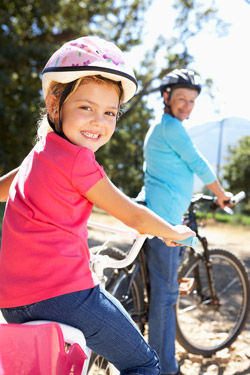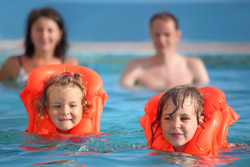Summertime and the livin' is easy-at least it should be. But too often it's not all ice cream cones and slushies. Make your summer the best it can be by practicing safety first.
Safety Tips For Pedestrians
 There's nothing like a walk outside to enjoy the warm weather, but remember to:
There's nothing like a walk outside to enjoy the warm weather, but remember to:
- Watch where you're walking and put the smart phone down.
- Turn down the music; you should always be able to hear what's going on around you.
- Cross at intersections or cross walks, and, like your mother told you, look both ways.
- Watch for traffic turning at intersections, or entering and leaving driveways or parking lots.
- Never assume a vehicle will stop for you, even if you have the right-of-way.
- Talk to your kids about how to be safe while walking; walk on sidewalks or paths, and cross at street corners using traffic signals and crosswalks.
- Children should be reminded to walk-never run-when crossing streets, and to only play in areas, away from streets, traffic and vehicles.
- Teach kids to put down their devices and then look left, right and left again when crossing the street.
- Children under 10 should cross the street with an adult. While every child is different, it can be hard for them to judge speed and distance of cars until age 10.
- Remind kids to make eye contact with drivers before crossing the street and to watch for cars that are turning or backing up.
Bike Safety: Tips For Cyclists
 In the nice weather, cyclists are as commonplace on the roads as cars and both need to share the road. Cyclists of all ages need to:
In the nice weather, cyclists are as commonplace on the roads as cars and both need to share the road. Cyclists of all ages need to:
- Obey the rules of the road.
- Make yourself seen and wear bright coloured clothing. Peel Regional Police remind bikers to have reflective lights on the front, back and side of your bike.
- Wear a helmet that fits properly.
- Use proper hand signals to tell others on the road of your intentions.
- Stay focused and never wear headphones or talk on the phone while biking.
There are also child bike safety courses available to give your young one the skills they need to ride safely.
Safety Tips For Drivers
It should go without saying, obey the rules of the road. But in summer, when there are more people to watch for, also:
- Take a second look for cyclists and pedestrians at intersections and driveways.
- Play it safe. Even when a pedestrian or cyclist doesn't have the right of way, yield to them.
- In residential areas especially, slow down.
Water Safety Tips: Swimming
 About 500 Canadians die a year in water-related incidents, so while the weather may be hot and the water inviting, water safety is important because water can be dangerous if precautions aren't taken.
About 500 Canadians die a year in water-related incidents, so while the weather may be hot and the water inviting, water safety is important because water can be dangerous if precautions aren't taken.
- Children should be supervised by a person who knows how to swim, who will stay within sight and reach of the child when in, on, or around water.
- Children should never be left alone-even for a second. If you have to go into the house, or away from the water, then bring them with you.
- Children who don't know how to swim, should wear a lifejacket.
- Learn to swim (it's great exercise); until you do, restrict your activities to wading only in shallow water when a lifeguard is on duty and you're wearing a floatation device.
- Learn CPR.
- Swim only during the day, and never at night or during storms.
- Do not swim when under the influence of drugs or alcohol.
- Never swim alone.
Road Trips! What's A Summer Without Them?
A road trip is always a great idea, but before you pack the car and the kids remember to:
- Have a mechanic look over your car and top-up all fluids, before leaving.
- Plan to drive 300 to 400 kilometres a day. By limiting how much you drive, you'll be able to stop at roadside attractions, enjoy meals and take breaks. Aim to stop driving by dinner, so you can eat and relax for the rest of the evening.
- Pack travel insurance, no matter how short or long the road trip.
- Get a good night's sleep, and share the driving responsibility.
- Make sure everyone is buckled up, all the time.




